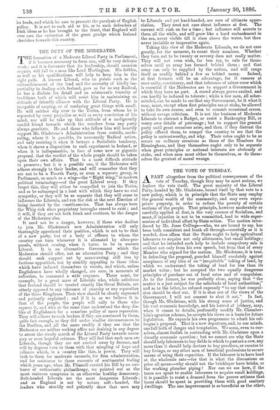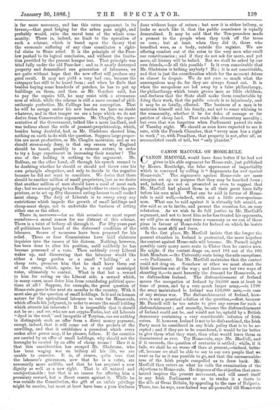THE VOTE OF TUESDAY.
APART altogether from the political consequences of the vote of Tuesday, though they may be most serious, we deplore the vote itself. The great majority of the Liberal Party, headed by Mr. Gladstone, bound itself by that vote to a new policy, which is in principle that the State may employ the general wealth of the community, and may even expro- priate property, in order to reduce the poverty of certain sections of the people. That principle, however moderately or carefully applied at first, is the very essence of Socialism, and must, if injustice is not to be committed, lead to wide super- session of individual effort by State action. The motion intro- duced by Mr. Jesse Collings—who, we are bound to say, has been both consistent and frank all through—carefully as it is worded, does affirm that the State ought to help agricultural labourers to acquire not only allotments, but small holdings ; and that he intended such help to include compulsory sale is evident not only from his own speech, but from that of every Member who argued for the motion. Mr. Gladstone, it is true, in defending the proposal, guarded himself resolutely against acceptance of any idea of an " inequitable " taking of land, by which we understand the taking of land for less than its market value ; but he accepted the two equally dangerous principles of purchase out of local rates and of compulsion. As to the former, he was perfectly clear, saying that "the matter is a just subject for the solicitude of local authorities;" and as to the latter, he refused expressly "to say that compul- sion should be shut out. If it is shut out of the views of the Government, I will not consent to shut it out." In fact, though Mr. Gladstone, with his strong sense of justice, and his vast economic knowledge, and his hatred of jobbery, may, when it comes to details, profoundly modify Mr. Chamber- lain's agrarian scheme, he accepts his views as a basis for future legislation. He expands his own programme to admit his col- league's proposal. That is a new departure, and, to our minds, one full both of danger and temptation. We seem, even to our- selves, almost foolish in contending with Mr. Gladstone upon a directly economic question ; but we cannot see why the State should help labourers to buy fields in which to pasture a cow, any more than it should help doctors to buy practices, or curates to buy livings, or any other men of beneficial professions to secure means of using their capacities. If the labourer is to have land at the wholesale rate—for that is what the discussions on price all mean—why should not the bricklayer have bricks, or the working plumber piping ? Nor can we see how, if the taxes are spent to enable labourers to acquire small holdings, it is possible to resist a demand from the poorer artisans that taxes should be spent in providing them with good sanitary dwellings. The one improvement is as beneficial as the other, is far more necessary, and has this extra argument in its favour,—that good lodging for the urban poor might, and probably would, raise the moral tone of the whole com- munity. There is, indeed, no limit to the operation of such a scheme, which is based upon the theory that the economic suffering of any class constitutes a right- ful claim to State relief. It is the principle of the Poor- law pushed to its logical conclusion, and without the limita- tion provided by the present hunger test. That principle was tried fully under the old Poor-law ; and as it nearly destroyed property and demoralised one generation of labourers, we are quite without hope that the new effort will produce any good result. It may not yield a very bad one, because the ratepayer has still to be heard from ; and when he finds that besides buying some hundreds of patches, he has to put up buildings on them, and then, as Mr. Goschen said, has to pay the repairs bill, he may resist with a strenuous- ness of which, while the scheme is still a mere counsel of phil- anthropic perfection, Mr. Collings has no conception. That he will be savage under his new burden we have no doubt -whatever, and in that temper we see a hope which we do not derive from Conservative arguments. Mr. Chaplin, the repre- sentative of the Government, talked like a mere landlord, and was tedious about the evils of peasant-proprietorship, which, besides being doubtful, had, as Mr. Gladstone showed him, nothing on earth to do with the question. Suppose large proper- ties are most productive, as Mr. Chaplin maintains, and as we should strenuously deny, is that any reason why England should be taxed, possibly to a ruinous extent, in order to try a huge experiment in increasing their number ? The size of the holding is nothing to the argument. Mr. Balfour, on the other hand, all through his speech seemed to be doubting whether he should or should not throw over his own principle altogether, and only to decide in the negative because he did not want to conciliate. We desire that there should be another million of small proprietors, just as we desire that another million of men should have a meal of meat each day; but we are not going to tax England either to create the pro- prietors, or to set up fifty thousand eating-houses to sell cooked meat cheap. The duty of Liberals is to sweep away any restrictions which impede the growth of small holdings and cheap-meat shops, not to undertake the business of letting either one or the other.
There is, moreover—for on this occasion we must repeat ourselves—a moral reason for our distrust of this scheme. There is a taint of bribery all through it. For fifty years past all politicians have heard of the distressed condition of the labourer. Scores of measures have been proposed for his relief. Three or four Commissions have held elaborate inquiries into the causes of his distress. Nothing, however, has been done to alter his position, until suddenly he has become possessed of a vote. Then suddenly every Liberal wakes up, and discovering that the labourer would like either a large garden or a small " holding " at a cheap rate, promises him that he shall have them out of the rates, which, again, he is, as a rural municipal voter, ultimately to control. What is that but a reward to him for voting on the Liberal side, a reward which, in many cases, must deter him from considering political ques- tions at all ? Suppose, for example, the great question of Home-rule goes in the next six months to the country. With it must also go the question of small holdings. Is it not in human nature for the agricultural labourer to vote for Home-rule, which offends his judgment, in order to secure the small holding which attracts his interests ? It is impossible that it should not be so ; and we, who are not crypto-Tories, but old Liberals "dyed in the wool," and incapable of Toryism, can see nothing to distinguish such an offer from a aired money payment, except, indeed, that it will come out of the pockets of the unwilling, and that it establishes a precedent which every seeker after power may, if he pleases, follow. If the coirnties are carried by an offer of small holdings, why should not the boroughs be carried by an offer of cheap rooms ? Hew it is that this consideration has escaped Mr. Gladstone, who has been waging war on bribery all his life, we are unable to conceive. It is, of course, quite true that the labourer's grievances, now that he is- a voter, are necessarily more audible, and that he has acquired a new dignity as well as a new right. That is all natural and unobjectionable ; but that is no reason for offering him a pecuniary reward, but a direct reason against it. While he was outside the Constitation, the gift of an unfair privilege might be unwise, but must at least have been a pure kindness
done without hope of return ; but now it is either bribery, or looks so much like it, that the public conscience is equally demoralised. It may be said that the Ten-pounders made a present to the people when they took off the taxes on corn ; but at least, when they did it, those who benefited were, as a body, outside the register. We are offering comfort out of the rates to the very men who swell our constituencies ; and if they do not ask for more, and yet more, all history will be belied. But we shall be asked by our own friends,—Is all this possible? Is it even conceivable that Mr. Gladstone is bribing anybody ? No ; it is not conceivable, and that is just the consideration which for the moment drives us almost to despair. We do not care so much what the unscrupulous may do, for they are always found out. It is when the scrupulous are led away by a false philanthropy, the philanthropy which treats grown men as little children, and declares that the State shall make them comfortable by doing their work, that the public morale is so injuriously, and it may be so fatally, affected. The business of a man is to maintain himself and his family, and not to come whining to the community, whether it be for doles of sausage or for patches of cheap land. That reads like elementary morality ; but even that was forgotten when Parliament passed its vote of Tuesday night. We should as soon have expected to see it vote, with the French Chamber, that "every man has a right to work ;" or, with Proudhon, that property is not, after all, an accumulated result of toil, but "only plunder."



































 Previous page
Previous page